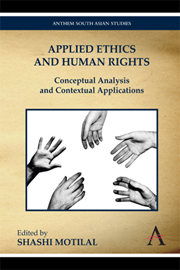Book contents
- Frontmatter
- Contents
- Preface
- Introduction
- Part One Rights, Obligations and Responsibilities
- 1 Applying Ethics: Modes, Motives and Levels of Commitment
- 2 Jurisprudence and the Individual: Bridging the General and the Particular
- 3 Why Moral Relativism Does Not Make Sense
- 4 Human Rights – A Theoretical Foray
- 5 Moral Relativism and Human Rights
- 6 Complicity and Responsibility
- 7 Dharma: The Overriding Principle of Indian Life and Thought
- 8 Moral Foundations of Social Order as Suggested in the Vaiśeṣikasūtras
- 9 Modern Western Conception of Justice as Equality before the Law and Dharmaśāstras
- Part Two Human Rights Issues
- Notes on Contributors
6 - Complicity and Responsibility
from Part One - Rights, Obligations and Responsibilities
Published online by Cambridge University Press: 05 March 2012
- Frontmatter
- Contents
- Preface
- Introduction
- Part One Rights, Obligations and Responsibilities
- 1 Applying Ethics: Modes, Motives and Levels of Commitment
- 2 Jurisprudence and the Individual: Bridging the General and the Particular
- 3 Why Moral Relativism Does Not Make Sense
- 4 Human Rights – A Theoretical Foray
- 5 Moral Relativism and Human Rights
- 6 Complicity and Responsibility
- 7 Dharma: The Overriding Principle of Indian Life and Thought
- 8 Moral Foundations of Social Order as Suggested in the Vaiśeṣikasūtras
- 9 Modern Western Conception of Justice as Equality before the Law and Dharmaśāstras
- Part Two Human Rights Issues
- Notes on Contributors
Summary
Dostoyevsky's novel, The Brothers Karamazov is constructed around the very complex and compelling ideal that action – committing an act and thereby causing something to be – is only one and perhaps a trivial element in the moral economy of guilt and wrongdoing. In the novel, all the brothers are guilty of their father's death, although only one of them has killed him, because each recognizes that he might have done so instead. Dostoyevsky plays with a not uncommon thought: the awareness of one's actual character traits sometimes warrants feelings of guilt and responsibility, ordinarily ascribed only to wrongdoers. We are responsible in this view, if we have the sort of character that could have done it, even though we did not actually do it; Gunter Grass' sardonic and rueful introspections trade on this thought, and much of the literature on collective violence, during partition, derives its power from holding us responsible by asking: are you the sort of person who could have done it? Even others wrongdoing can impugn our character and our values make us feel guilty and responsible, even if we did not ourselves do anything wrong. All we need to do is counterfactually establish that we could have done it. The suspicion that one might oneself be capable of acting wrongly or monstrously is an instance of what Christopher Kutz has called counterfactual guilt.
- Type
- Chapter
- Information
- Applied Ethics and Human RightsConceptual Analysis and Contextual Applications, pp. 83 - 90Publisher: Anthem PressPrint publication year: 2010



